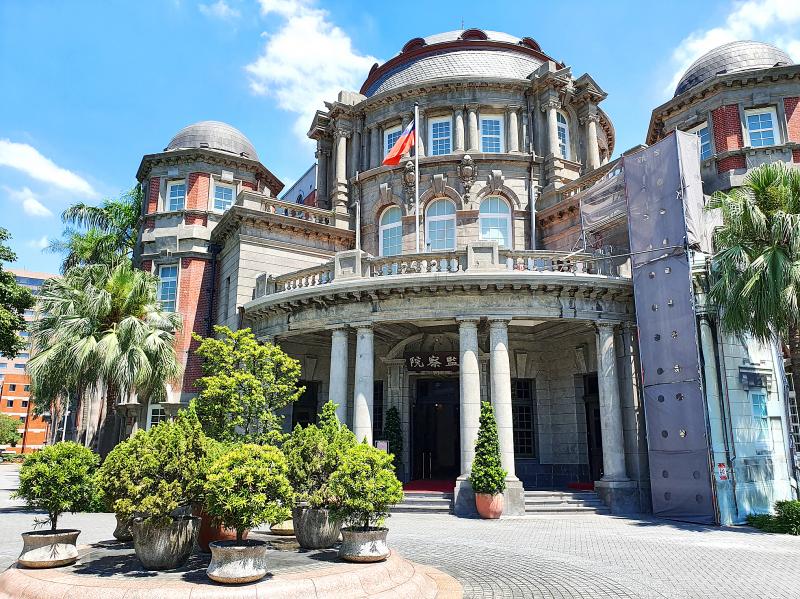Forced labor in Taiwan’s distant-water fishing fleet must be addressed, the Control Yuan said on Thursday, when it issued demands of government entities over the issue.
The US in a report on child and forced labor in September last year for the first time said that fish caught by Taiwanese-flagged vessels are products of forced labor.
“Crews on Taiwan-flagged vessels face confiscation of documents, long days with little rest, physical and verbal abuse, and lack of payment,” the US report said.

Photo: Hsieh Chun-lin, Taipei Times
Control Yuan member Wang Yu-ling (王幼玲) said that the Ministry of Foreign Affairs, the Ministry of Labor and the Fisheries Agency have known about forced labor on the Taiwanese fleet since as early as 2019, when Greenpeace released a report on the issue.
The government bodies knew that Greenpeace would submit its findings to Washington, but took no concrete measures to address the issue, Wang said.
To spur reforms, the Control Yuan has demanded that the three bodies take corrective measures to ensure fishers’ rights are protected.
It is also urging the Executive Yuan to make changes, she said.
If this issue is not dealt with, Taiwan faces being banned from exporting fish to the US and Europe, Control Yuan member Tsai Chung-yi (蔡崇義) said.
Among the demands is that the Fisheries Agency assign more personnel to conduct inspections, and for it and the Ministry of Labor to educate the fisheries industry on human rights.
Executive departments should ensure that their employees have a clear understanding of what constitutes forced labor, as such cases are sometimes classified as employer-employee disputes, the Control Yuan said in a statement.
Cross-agency communication — within executive departments and between departments and the Judicial Yuan — is required so reports of forced labor are dealt with efficiently and perpetrators punished, the statement said.
The Executive Yuan is required to evaluate whether a ban on products of child labor and forced labor is needed, as well as review policies on migrant fishers, it said.
Taiwan has 1,106 distant-water fishing vessels and the sector employs about 22,000 migrant fishers, the Control Yuan said.
However, the US report said that an estimated 35,000 migrant workers, mostly from Indonesia and the Philippines, work on such vessels, and that Taiwan’s fleet is the world’s second-largest, after China’s, the Control Yuan said.
The Fisheries Agency said in a statement that it would work to improve so Taiwan would not be included in a US report on child and forced labor again.
Taiwanese law says that after receiving a corrective measure issued by the Control Yuan, government departments should immediately make improvements or take appropriate action.
They should also reply to the Control Yuan in writing on improvements or actions.
If the Control Yuan receives no reply within two months, it may seek further details.

The manufacture of the remaining 28 M1A2T Abrams tanks Taiwan purchased from the US has recently been completed, and they are expected to be delivered within the next one to two months, a source said yesterday. The Ministry of National Defense is arranging cargo ships to transport the tanks to Taiwan as soon as possible, said the source, who is familiar with the matter. The estimated arrival time ranges from late this month to early next month, the source said. The 28 Abrams tanks make up the third and final batch of a total of 108 tanks, valued at about NT$40.5 billion

A group from the Taiwanese Designers in Australia association yesterday represented Taiwan at the Midsumma Pride March in Melbourne. The march, held in the St. Kilda suburb, is the city’s largest LGBTQIA+ parade and the flagship event of the annual Midsumma Festival. It attracted more than 45,000 spectators who supported the 400 groups and 10,000 marchers that participated this year, the association said. Taiwanese Designers said they organized a team to march for Taiwan this year, joining politicians, government agencies, professionals and community organizations in showing support for LGBTQIA+ people and diverse communities. As the first country in Asia to legalize same-sex

Travel agencies in Taiwan are working to secure alternative flights for travelers bound for New Zealand for the Lunar New Year holiday, as Air New Zealand workers are set to strike next week. The airline said that it has confirmed that the planned industrial action by its international wide-body cabin crew would go ahead on Thursday and Friday next week. While the Auckland-based carrier pledged to take reasonable measures to mitigate the impact of the workers’ strike, an Air New Zealand flight arriving at Taipei from Auckland on Thursday and another flight departing from Taipei for Auckland on Saturday would have to

MOTIVES QUESTIONED The PLA considers Xi’s policies toward Taiwan to be driven by personal considerations rather than military assessment, the Epoch Times reports Chinese President Xi Jinping’s (習近平) latest purge of the Chinese People’s Liberation Army (PLA) leadership might have been prompted by the military’s opposition to plans of invading Taiwan, the Epoch Times said. The Chinese military opposes waging war against Taiwan by a large consensus, putting it at odds with Xi’s vision, the Falun Gong-affiliated daily said in a report on Thursday, citing anonymous sources with insight into the PLA’s inner workings. The opposition is not the opinion of a few generals, but a widely shared view among the PLA cadre, the Epoch Times cited them as saying. “Chinese forces know full well that